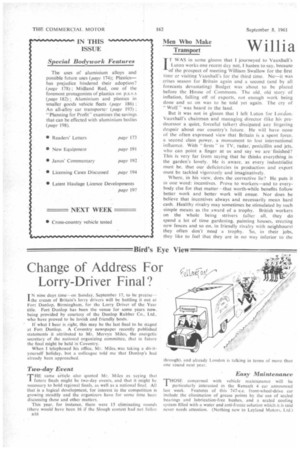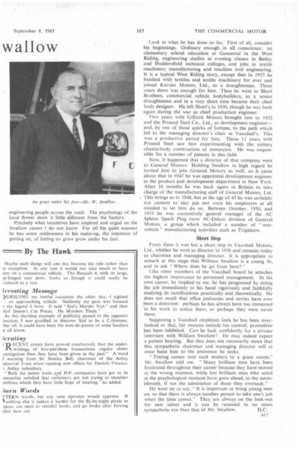Men Who Make Transport
Page 50

Page 51

If you've noticed an error in this article please click here to report it so we can fix it.
Willia
wallow
IT WAS in some gloom that I journeyed to Vauxhall's Luton works one recent day not, I hasten to say, because of the prospect of meeting William Swallow for the first time or visiting Vauxhall's for the third time. No—it was crises season for Britain again and a second (and by all forecasts devastating) Budget was about to be placed before the House of Commons. The old, old story of inflation, falling off of exports, not enough work being done and so on was to be told yet again. The cry of
" Wolf " was heard in the land. .
But it was not in gloom that I left Luton for London. Vauxhall's chairman and managing director (like his predecessor a quiet, forceful talker) dissipated any lingering despair about our country's future. He will have none of the often expressed view that Britain is a spent force. a second class power, a monument to lost international influence. With " firsts" in TV. radar, penicillin and jets, who can pint a finger at us and say we are finished? This is very far from saying that he thinks everything in the garden's lovely. He is aware, as every industrialist must be, that our deficiencies in production and export must be tackled vigorously and imaginatively.
Where, in his view, does the corrective lie? He puts it in one word: incentives. Prove to workers—and to everybody else for that matter—that worth-while benefits follow better work and better work will ensue. Nor does he believe that incentives always and necessarily mean hard cash. Healthy rivalry may sometimes be stimulated by such simple means as the award of a trophy. British workers on the whole being strivers (after all, they do spend a lot of time gardening, painting houses, erecting new fences and so on. in friendly rivalry with neighbours) they often don't need a trophy. So, in their jobs, they like to feel that they are in no way inferior to the
engineering people across the road. The psychology of the local flower show is little different from the factory.
Precisely what incentives have inspired and urged on the Swallow career I do not know. For all his quiet manner he has some restlessness in his make-up, the intention of getting on, of !citing no grass grow under his feet. Look at what he has done so far. First of all, consider his beginnings. Ordinary enough in all conscience : an elementary school education at Gomersal in the West Riding, engineering studies at evening classes in Batley and Huddersfield technical colleges, and jobs in textile machinery manufacturing and machine tool engineering. It is a typical West Riding story, except that in 1923 he finished with textiles and textile machinery for ever and joined Karrier Motors, Ltd., as a draughtsman. Three years there was enough for him. Then he went to Short Brothers, commercial vehicle bodybuilders, as a senior draughtsman and in a very short time became their chief body designer. He left Short's in 1930, though he was back again during the war as chief production engineer.
Two years with Gilford Motors brought him to 1932 and the Pressed Steel Co., Ltd., as development engineer— and, by one of those quirks of fortune, to the path which led to the managing director's chair at Vauxhall's. This was a productive period for him. Those 11 years with Pressed Steel saw him experimenting with the unitary chassis/body construction of motorcars. He was responsible for a number of patents in this field.
Now, it happened that a director of that company went to General Motors. Holding Swallow in high regard he invited him to join General Motors as well; so it came about that in 1947 he was appointed development engineer in the product and development department in New York. After 16 months he was back again in Britain to take charge of the manufacturing staff of General Motors, Ltd.
, This brings us to 1948, but at the age of 43 he was certainly not content to stay put nor were his employers at all minded to let him, do so. Between October, 1950, and 1953 he was successively general manager of the AC Sphinx Spark Plug (now AC-Delco) division of General Motors, a group which included a number of "nonvehicle" manufacturing activities such as Frigidaire.
Short Step
From there it was but a short step to Vauxhall Motors.
Ltd., whither he went as director in 1956 and remains today as chairman and managing director. It is appropriate to remark at this stage that William Swallow is a young 56, and to ask "Where does he go from here? "
Like other members of the Vauxhall board he attaches the highest importance to personnel management. In his own career, he implied to me, he has progressed by doing the job immediately to his hand vigorously and faithfully studying its ramifications practically and theoretically. He does not recall that office jealousies and envies have ever been a deterrent—perhaps he has always been too immersed in his work to notice them, or perhaps they were never there.
Supposing a Vauxhall employee feels he has been over looked or that, for reasons outside his control, promotion has been inhibited. Can he look confidently for a private interview with William Swallow? He may indeed expect a patient hearing. But that does not necessarily mean that this sympathetic chairman and managing director will at once hoist him to the eminence he seeks.
"Timing comes into such matters to a great extent," Mr. Swallow told me. "Many brilliant men have been frustrated throughout their career because they have moved at the wrong moment, while less brilliant ones who acted at the psychological moment have gone ahead, to the astonishment, if not the admiration of those they overtook."
He went on to say, "It is important to bring young men on, so that there is always another person to take one's job when the time comes." They are always on the look-out for new talent and it can be revealed to no more sympathetic eye than that of Mr. Swallow. H.C.


































































































































































